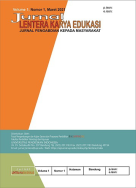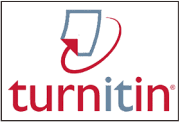PENGUATAN PENYIAPAN KOMPETENSI LULUSAN SMK TEKNIK LOGISTIK YANG DIBUTUHKAN INDUSTRI LOGISTIK
Abstract
Full Text:
PDFReferences
Abdullah, N. S., Sumarwati, S., Aziz, M. I. A., Ziden, A. A., Razak, N. A., & Jalil, S. A. (2020). Life and career skills amongst technical and vocational education and training (TVET) students. International Journal of Innovation, Creativity and Change, 11(12), 637–654.
Aharonovitz, M. C. S., Vieira, J. G. V., & Suyama, S. S. (2018). How logistics performance is affected by supply chain relationships. International Journal of Logistics Management, 29(1), 284–307. https://doi.org/10.1108/IJLM-09-2016-0204
Albashiry, N. M., Voogt, J. M., & Pieters, J. M. (2015). Improving curriculum development practices in a technical vocational community college: examining effects of a professional development arrangement for middle managers. Curriculum Journal, 26(3), 425–451. https://doi.org/10.1080/09585176.2015.1040041
Ana, A., Dwiyanti, V., Nikmawati, E. E., Subekti, S., & Murniati, D. (2019). Competences of Industry 4.0: Is the importance of Leadership in the Food Service Industry? 379(Veic), 271–275. https://doi.org/10.2991/assehr.k.191217.044
Ana, A., Kustiawan, I., Ahman, E., Zakaria, S., Muktiarni, M., Dwiyanti, V., & Saripudin, S. (2020). Defining Vocational Teacher Competencies in Industry 4 . 0 from the Perspective of Policymakers. 34, 159–167.
Badenhorst, J. W., & Radile, R. S. (2018). Poor Performance at TVET Colleges: Conceptualising a Distributed Instructional Leadership Approach as a Solution. Africa Education Review, 15(3), 91–112. https://doi.org/10.1080/18146627.2017.1352452
Bag, S., Gupta, S., & Luo, Z. (2020). Examining the role of logistics 4.0 enabled dynamic capabilities on firm performance. International Journal of Logistics Management, 31(3), 607–628. https://doi.org/10.1108/IJLM-11-2019-0311
Barliana, M. S., Alhapip, L., Rahmawati, Y., & Dwiyanti, V. (2020). Vocational Education : The New Development and Change in the Adaptive Curriculum of Learning Model. 2, 160–173.
Bekri, R. M., Ruhizan, M. Y., Norazah, M. N., Norman, H., Nur, Y. F. A., & Ashikin, H. T. (2015). The Formation of an E-portfolio Indicator for Malaysia Skills Certificate: A Modified Delphi Survey. Procedia - Social and Behavioral Sciences, 174, 290–297. https://doi.org/10.1016/j.sbspro.2015.01.660
Chen, W., & Li, G. (2016). Research of Logistics Engineering Training Mode based on School-Enterprise Cooperation. Ieesasm, 1110–1113. https://doi.org/10.2991/ieesasm-16.2016.242
Chinyere Shirley, A., Chijioke, O. P., & Benjamin Chukwumaijem, O. (2015). Towards Quality Technical Vocational Education and Training (Tvet) Programmes in Nigeria: Challenges and Improvement Strategies. Journal of Education and Learning, 4(1), 25–34. https://doi.org/10.5539/jel.v4n1p25
Geng, B. B. & X. (2014). ( Beijing Normal University , China ) Transferable skills in technical and vocational education and training ( TVET ): Policy and practice in China 1. 2012, 1–12.
Jones, C., Pimdee, P., Waters, A., Kiel, D., Delaila Abdullah, Abdullah, M. Y., Salleh, Mo. A. M., Drath, R., Horch, A., Amsden, A. H., Jeanmonod, D. J., Rebecca, Mudin, D. K. D., Eng, H. S., Rahman, M., Ibrahim, P., Jopony, M., & Marimuthu, T. (2017). Innovative ideas: Thailand 4.0 and the fourth industrial revolution. International Association for Management of Technology, 2(1), 4–35. https://doi.org/10.2307/2006870
Khaled, A., Gulikers, J., Biemans, H., van der Wel, M., & Mulder, M. (2014). Characteristics of hands-on simulations with added value for innovative secondary and higher vocational education. Journal of Vocational Education and Training, 66(4), 462–490. https://doi.org/10.1080/13636820.2014.917696
Lee, J., Kao, H. A., & Yang, S. (2014). Service innovation and smart analytics for Industry 4.0 and big data environment. Procedia CIRP, 16, 3–8. https://doi.org/10.1016/j.procir.2014.02.001
Marinho, P., & Delgado, F. (2019). A Curriculum in Vocational Courses: The Recognition and (Re)Construction of Counterhegemonic Knowledge. Educational Forum, 83(3), 251–265. https://doi.org/10.1080/00131725.2019.1599650
Meng, T., & Fuhang, L. (2020). Training Mode of Logistics Professionals in Secondary Vocational Schools Based on School Enterprise Cooperation. 500(Ismss), 391–396. https://doi.org/10.2991/assehr.k.201202.146
Moldovan, L. (2020). A Reference Framework for Continuous Improvement of Employability Assessment. Procedia Manufacturing, 46, 271–278. https://doi.org/10.1016/j.promfg.2020.03.040
Olander, C., & Olander, M. H. (2013). Professional Development through the Use of Learning Study: Contributions to Pedagogical Content Knowledge in Biology. Procedia - Social and Behavioral Sciences, 89, 205–212. https://doi.org/10.1016/j.sbspro.2013.08.835
Peraturan Presiden Republik Indonesia. (2012), Perturan Presiden Republik Indonesia Nomor 26 Tahun 2012 Tentang Cetak Biru Pengembangan Sistem Logistik Nasional.
Polater, A. (2020). Airports’ role as logistics centers in humanitarian supply chains: A surge capacity management perspective. Journal of Air Transport Management, 83(January), 101765. https://doi.org/10.1016/j.jairtraman.2020.101765
Rahmawati, Y., Alhapip, L., Barliana, M. S., Ana, A., & Dwiyanti, V. (2021). Original Paper Adaptive Curriculum Development on Tourism Vocational Secondary Education. 5(1). https://doi.org/10.22158/asir.v5n1p39
Ravikumar, K. J., & Manjunath, T. (2020). Internal Logistics Simulation for a New Production Line under a Risk Assess- ment Approach.
Reeve, E. M. (2016). 21St Century Skills Needed By Students in Technical and Vocational Education and Training. Asian International Journal of Social Sciences, 16(4), 65–82. https://doi.org/aining (TVET). Asian International Journal of Social Sciences, 16(4), 62 – 74. https://doi.org/10.29139/aijss.20160404
Sasipraba, T., Kaja Bantha Navas, R., Nandhitha, N. M., Prakash, S., Jayaprabakar, J., Poorna Pushpakala, S., Subbiah, G., Kavipriya, P., Ravi, T., & Arunkumar, G. (2020). Assessment tools and rubrics for evaluating the capstone projects in outcome based education. Procedia Computer Science, 172(2019), 296–301. https://doi.org/10.1016/j.procs.2020.05.047
Temjanovski, R., & Arsova, M. (2020). Logistics Education in Universities in 21 st Century : New Trends and Challenges. September, 18–20.
Thoonen, E. E. J., Sleegers, P. J. C., Oort, F. J., & Peetsma, T. T. D. (2012). Building school-wide capacity for improvement: the role of leadership, school organizational conditions, and teacher factors. School Effectiveness and School Improvement, 23(4), 441–460. https://doi.org/10.1080/09243453.2012.678867
Thoonen, E. E. J., Sleegers, P. J. C., Oort, F. J., Peetsma, T. T. D., & Geijsel, F. P. (2011). How to improve teaching practices: The role of teacher motivation, organizational factors, and leadership practices. Educational Administration Quarterly, 47(3), 496–536. https://doi.org/10.1177/0013161X11400185
Uckat, H., & Woodruff, C. (2019). Learning What to Look For: Hard Measures of Soft Skills in Promotion. November.
United Nation. 2015. The 17 Goals Sustainable Development Goals. https://sdgs.un.org/goals
van der Bijl, A., & Taylor, V. (2016). Nature and Dynamics of Industry-Based Workplace Learning for South African TVET Lecturers. Industry and Higher Education, 30(2), 98–108. https://doi.org/10.5367/ihe.2016.0297
van Laar, E., van Deursen, A. J. A. M., van Dijk, J. A. G. M., & de Haan, J. (2020). Determinants of 21st-Century Skills and 21st-Century Digital Skills for Workers: A Systematic Literature Review. SAGE Open, 10(1). https://doi.org/10.1177/2158244019900176
Wu, L., Yue, X., Jin, A., & Yen, D. C. (2016). Smart supply chain management: A review and implications for future research. International Journal of Logistics Management, 27(2), 395–417. https://doi.org/10.1108/IJLM-02-2014-0035
DOI: https://doi.org/10.17509/lekaedu.v1i2.35943
Refbacks
- There are currently no refbacks.

This work is licensed under a Creative Commons Attribution-ShareAlike 4.0 International License. View My Stats









